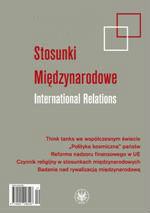KULTUROWE UWARUNKOWANIA PRAW CZŁOWIEKA
The Cultural Foundations of Human Rights
Author(s): Grażyna MichałowskaSubject(s): Politics / Political Sciences
Published by: Wydawnictwa Uniwersytetu Warszawskiego
Keywords: PRAWA; CZŁOWIEKA; CZLOWIEKA; HUMAN; RIGHTS
Summary/Abstract: In the contemporary world – which is relatively stable, if not entirely free from political conflicts and local strife – observance of human rights laws is not only an important criterion of a state’s level of democracy, but also a crucial issue in international relations. This stance is almost universally accepted in the Western world; yet it breeds questions concerning the possible contradiction between the collective right to sovereignty as delineated by the International Covenants on Human Rights, which includes the right to embrace a social group’s cultural development, and the rights of an individual. The first indicates that social groups should be able to cultivate their own customs and cultural traditions free from fear of intervention; the latter, however, mean that an individual is able to remain free of such customs and traditions which endanger that individual’s personal security and physical integrity. From this contradiction there spring several questions: as to the hierarchy of importance of those rights, as to the possibility of retaining cultural diversity, and finally as to the role of culture in integrating social groups and in preserving their cultural identity. The fact that international organizations, especially UNESCO, are abandoning cultural relativism – according to which all cultures are equal and impossible to rate as more or less worthy – in favour of supporting only those cultures which remain in accord with human rights has aroused an almost universal protest from cultural anthropologists. In this situation it is crucial to consider that the very concept of contemporary human rights is culturally determined and changes with the development of civilization, and that it does not necessarily have to be accepted in all cultural environments. In some environments, this concept may be as alien as the ways of thinking, patterns of behaviour and cultural mores of some communities are to the “Western world”.
Journal: Stosunki Międzynarodowe
- Issue Year: 37/2008
- Issue No: 1-2
- Page Range: 9-98
- Page Count: 20
- Language: Polish

